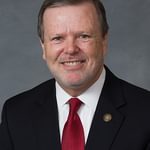

For the third time since 2012, no one in North Carolina was sentenced to death in 2017. All four trials in 2017 in which prosecutors sought a death sentence ended with a jury either acquitting the defendant of capital murder or returning a lesser sentence. Despite the historical decline in death sentencing in North Carolina, two state legislative leaders, in a letter derided by editorial boards as political posturing, used the recent killing of three prison guards to demand that Governor Roy Cooper and Attorney General Josh Stein “restart” executions in the state. House Speaker Tim Moore (pictured, left) and Senate President pro-tem Phil Berger (pictured, right), claimed that Cooper’s and Stein’s purported “indifference and failure to fight the moratorium [on executions in North Carolina] endangers the lives of prison employees in close proximity to hardened murderers with nothing left to lose, who see no possibility they will face execution for killing again.” Editorial reaction to the legislators’ comments was swift and sharp. The Greensboro News and Record called the accusation in the letter “a vulgar insinuation unsupported by facts.” The Charlotte Observer editorialized that the legislative leaders were “seeking to politicize the tragedy rather than effectively remedy the conditions that make the state’s prisons so dangerous for correctional officers.” Their actions, the paper said, were akin to “creating and tolerating the conditions that allow inmates to kill prison workers, then blaming the officers’ deaths on the governor whose administration is trying to actually address the problem.” Raleigh’s News and Observer editorial board called Moore and Berger’s letter “absurd,” “shameless,” and a “political gambit” that was “demagogu[ing] the death penalty.” It wrote, “[n]either the governor nor the AG can restart the death penalty, which is under legal challenge on a multitude of grounds, as it is in many states. That’s why no one has been put to death by the state in more than 10 years. … [A]s long as legal challenges are pending, the death penalty can’t be restarted as if the task were just like turning on a light switch.” A Capitol Broadcasting Company editorial called the legislators’ charges “[c]ynical and shameful” “pathetic,” and “political posturing.” The company said, “Regardless of how anybody feels about capital punishment … , it will do NOTHING to help make our prisons any more secure or help to make it safer for guards and other personnel who have to work inside them.” Gretchen M. Engel, executive director of the Center for Death Penalty Litigation, provided context for North Carolina’s use of the death penalty, noting that “[m]ore than three-quarters of death row inmates were sentenced at least 15 years ago, in an era when North Carolina juries sentenced to death dozens of people a year under less-enlightened laws. … Defendants on trial for their lives did not have basic protections such as qualified attorneys or laws requiring that confessions be recorded.” She credits high-profile exonerations, like that of Henry McCollum, for contributing to the reduction in death sentences in the state. “There are some elected officials in North Carolina who still like to talk about the death penalty for political purposes, but that’s about the only way it’s being used anymore,” Engel said. Rob Schofield of NC Policy Watch said, “Berger and Moore would do much more for the safety and security of prison personnel if they would invest adequate resources in our corrections system.”
(G. Engel, “In 2017, no new death sentences and a frail and aging N.C. death row,” The Herald Sun, December 15, 2017; J. Billman, “Nobody in North Carolina Was Sentenced to Death in 2017,” Indy Week, December 14, 2017; Editorial, “Berger and Moore’s political posturing shames sacrifice of late N.C. prison workers,” Capitol Broadcasting Company, WRAL.com, December 13, 2017; Editorial, “Moore and Berger play politics with the NC death penalty,” The News & Observer, December 12, 2017; Editorial, “Phil Berger and Tim Moore play politics in the face of tragedy,” Charlotte Observer, December 11, 2017; R. Schofield, “Shameless legislative posturing on the death penalty,” NC Policy Watch, December 19, 2017; Editorial, “Our Opinion: Execution politics,” Greensboro News & Record, December 20, 2017.) See Sentencing and 2017 Year End Report.



